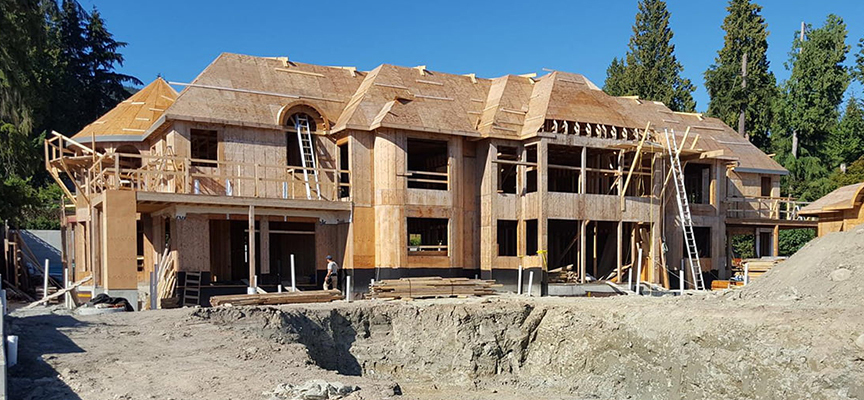
Do you remember the 2016 Fort McMurray wildfire? An entire city was evacuated with 2400 homes burned to the ground. Wildfires may be the most extreme example but even everyday home fires can cause devastating loss.
In Vancouver, the risks may feel different, but the potential for fire damage remains just as real. And in an area close to forested lands, Vancouver’s homes are particularly at risk during the drier months.
But here’s the good news: we have tools and strategies to prevent this kind of destruction. With the right materials, designs, and fire-resistant building techniques, you can do fire-safe residential construction.
Fire-Safe Construction Materials
The choice of building materials significantly impacts a home’s ability to withstand fire. Fire-resistant materials slow down the spread of flames allowing occupants more time to evacuate and first responders more time to arrive.
Here’s a closer look at the best materials for residential construction in Vancouver to enhance fire safety.
Concrete And Stone: Natural Fire Barriers
Concrete and stone are inherently fire-resistant making them ideal for residential construction. Concrete, for instance, has a high thermal mass that absorbs and stores heat slowing down the spread of flames.
It’s especially effective in building foundations and structural walls, where durability and fire resistance are crucial. Stone, meanwhile, is non-combustible and can withstand intense heat making it ideal for exterior cladding.
Brick And Masonry: Classic & Reliable Choices
Brick and masonry are classic choices that add aesthetic appeal and fire resistance. Like concrete, brick is non-combustible and can absorb heat. This makes it a valuable choice for walls and structural elements.
Masonry also requires little maintenance and has a long lifespan. It is cost-effective for homeowners aiming for fire-safe construction.
Gypsum and Fire-Retardant Drywall
Interior walls often use gypsum-based drywall as gypsum has a high water content that helps resist fire. When exposed to heat, gypsum releases water vapour slowing the spread of flames.
Many modern residential constructions in Vancouver utilize Type X drywall, which has additional fire-resistant properties. This material is an affordable, easy-to-install option for enhancing fire safety in residential spaces.
Key Design Strategies For Fire-Safe Residential Construction
Beyond materials, specific design strategies help limit fire damage and improve a structure’s resilience. Safety structures are an important aspect of modern-day construction.
Let’s take a look at some design strategies focusing on creating barriers and providing escape routes in the event of a fire.
Creating Fire Breaks In Building Layout
Fire breaks are gaps or barriers within a building that prevent flames from spreading to other areas. In residential construction, fire breaks can include fire-rated walls, floors, and doors, which slow the progress of fire from one room to another.
In Vancouver’s densely populated neighbourhoods, fire breaks are essential to containing potential fires and protecting adjacent homes.
Defensible Space: Landscaping For Fire Safety
A defensible space is a landscaping concept that keeps flammable materials away from your home creating a buffer zone around the house that minimizes fire risk.
By strategically placing fire-resistant plants and choosing gravel over mulch, homeowners can prevent flames from reaching their property.
Multi-Layered Roof Protection
The roof is often the most vulnerable part of a home in a fire. Consider using non-combustible materials like metal or fire-resistant asphalt shingles for roofing.
Installing fire-resistant underlayment beneath the roofing material adds an extra layer of protection; it helps to keep embers and flames at bay and this multi-layered approach significantly enhances fire resistance.
Active Fire Protection Systems For Residential Construction
Active fire protection involves systems that detect, suppress, or extinguish fires. These systems are particularly important in residential construction, where immediate detection and response can make a life-saving difference.
Here are some active fire protection systems:
- Smoke detectors and alarm systems
- Residential sprinkler systems
- Fire extinguishers in key locations
Fire-Safe Construction Standards And Vancouver Building Codes
Vancouver has some of Canada’s strictest building codes regarding fire safety reflecting the city’s commitment to protecting residents. For anyone involved in residential construction adhering to these codes is non-negotiable.
Understanding local requirements helps builders meet fire safety standards while delivering high-quality and secure homes.
Fire Resistance Ratings
The Vancouver building code mandates specific fire resistance ratings for walls, floors, and roofs in residential construction.
Fire resistance ratings are measured in hours indicating how long a building component can withstand fire before collapsing. Ensuring all construction materials meet or exceed these ratings is crucial in creating a fire-safe structure.
Ventilation Requirements For Fire Safety
Ventilation plays a dual role in residential construction offering airflow and fire safety benefits. Fire-resistant vents prevent embers and flames from entering a home through attic spaces or other openings.
In Vancouver’s humid climate, proper ventilation also reduces moisture which can compromise building materials over time indirectly affecting fire safety.
Get Premium Residential Construction With Eurobuild
Eurobuild specializes in designing and building custom homes with an emphasis on safety, quality, and customer satisfaction. With extensive experience in residential construction, we offer personalized solutions for homeowners looking to build or renovate.
For construction expertise and a consultation on your next project, contact us.

